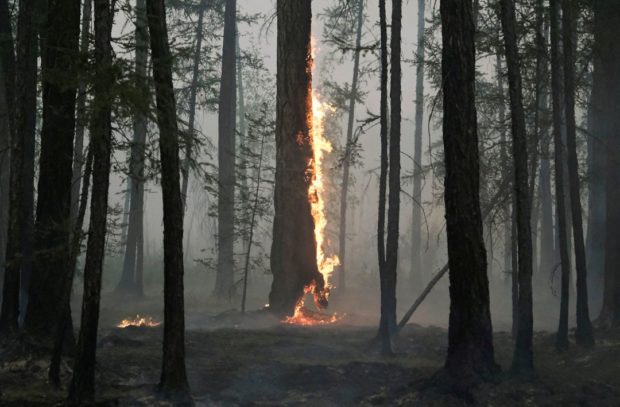
A tree burns during a wildfire near the village of Taastaakh in the region of Yakutia, Russia August 11, 2021. Picture taken August 11, 2021. REUTERS
SAO PAULO — The world lost an area of forest the size of the U.S. state of Wyoming last year, as wildfires in Russia set all-time records and Brazilian deforestation of the Amazon remains high, a global forest monitoring project report said on Thursday.
Global Forest Watch, which is backed by the non-profit World Resources Institute (WRI) and draws on forest data collected by the University of Maryland, said in a report that roughly 253,000 square kilometers (97,683 square miles) of forest were lost in 2021.
Forests provide a buffer against climate change because of the vast amounts of carbon dioxide that they absorb and their rapid destruction is putting global climate targets at risk, WRI analysts said in a briefing.
The high level of 2021 forest loss, while roughly flat with 2020, does not match up with the commitment announced by more than 100 world leaders at a United Nations climate summit last November to halt deforestation by 2030, the analysts said.
“We are not seeing the downward decline (in forest loss) we would expect to see those results,” said Rod Taylor, WRI’s global forests program director, referring to the 2030 commitment.
The causes of the reduction in forest cover include human and natural causes, as well as deforestation, wildfires and other destruction.
Loss of 37,500 square kilometers of old-growth tropical rainforest is particularly concerning because the dense vegetation holds high levels of carbon, WRI analysts said.
Although that destruction was slightly lower than 2020, it caused carbon dioxide emissions equivalent to all of the fossil fuel India burns in a year, the report said.
That destruction was overwhelmingly from human’s permanently clearing the land, with more than 40% of that loss in Brazil.
Cold boreal forests found in the far northern regions like Canada, Russia and Alaska lost more than 80,000 square kilometers of area last year, the highest level since records began in 2001.
The majority of that loss was due to record fires in Russia, driven by hotter and drier conditions that are likely linked to climate change, the report said.
“It’s hugely worrying,” Taylor said.
“We’re seeing fires burning more frequently, more intensively and more broadly than they ever would under normal conditions.”
RELATED STORIES
Fighting deforestation on the ground
Saving what’s left of our forests
Sierra Madre deforestation cancels gains of greening program
Deforestation of Brazil’s Amazon jumps 22% in annual gov’t report